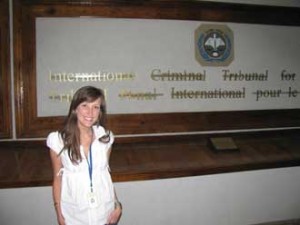
This past summer eight McGill students were awarded a total of $64,000 by the Association of Universities and Colleges to pursue internships in the area of health, the environment and governance. Funded by the Canadian International Development Agency, these students rolled up their sleeves to do the hard work in such faraway places as South Africa, the Philippines, Tanzania and China. We asked some of our intrepid travelers to give their impressions of what it’s like working abroad.
<!–[if !supportEmptyParas]–> <!–[endif]–>
<!–[if !supportEmptyParas]–>Jeannine Plamondon, U3 Law
<!–[if !supportEmptyParas]–><!–[endif]–> Internship: Plamondon was a legal intern in the Office of the Prosecutor at the International Criminal Tribunal for Rwanda (ICTR) in Arusha, Tanzania.
<!–[if !supportEmptyParas]–><!–[endif]–> Snapshot moment: “Hearing the firsthand accounts of genocide survivors while visiting the genocide memorials and massacre sites in and around Kigali. My taxi driver Célestin described that he had survived the genocide by hiding for four months in an outhouse belonging to a Hutu friend who brought him scraps of food. He said the smell of the outdoor toilet is what kept the Interahamwe away. For him it is no longer a foul smell, but the smell of life.”
<!–[if !supportEmptyParas]–><!–[endif]–> Lesson(s) learned: “I learned the importance of international intervention while human rights violations are occurring. Although the ICTR is bringing those most responsible for the genocide to justice, it cannot replace the lives taken or heal the emotional scarring of those who have survived.”
<!–[if !supportEmptyParas]–> Justin Dubois, U3 Law
Internship: Dubois provided legal aid and support to refugees at the Refugee Law Project in Kampala, Uganda.
<!–[if !supportEmptyParas]–><!–[endif]–> Snapshot moment: “My most memorable moments were spent having lunch with my colleagues crammed in one office with the two desks as our tables and the hot pepper passed around to spice up the matooke and beans. It was a time to exchange ideas on the cases we were working on; where I learned the most about Uganda and its people; and where I got to know individuals I came to greatly respect and appreciate. It may not be the flashiest memorable moment, but for me, it is the most tangible.”
<!–[if !supportEmptyParas]–><!–[endif]–> Lesson(s) learned: “There are too many to capture in few words. In sum, the best – and often hardest – way for individuals to meet their own needs is to ensure that they are provided with the proper means. That, and the importance of patience.”
<!–[if !supportEmptyParas]–> Annelise Miller, U2 B.A. & BSc. Environment, Minor Geography
<!–[if !supportEmptyParas]–>Internship: Miller interned at the Inter-American Institute for Cooperation in Agriculture (IICA) in Barbados where she conducted a feasibility study on the economic benefits of home gardening to alleviate food insecurity; created educational materials on sustainable gardening and the health benefits of domestic food production; and gave talks to local stakeholders and NGOs.
<!–[if !supportEmptyParas]–><!–[endif]–> Snapshot moment: “I attended the St. George Parish Independence Celebration in Barbados, a ceremony unveiling the community’s annual project. This year’s focus struck a chord in me, because it mirrored the very goals of my internship: St. George decided it wanted to return to its agricultural roots and promote local food production and agricultural education. It was an honour to have been invited to participate in the ceremony and it was both touching and thrilling to witness the community’s spirit and commitment to the project – local school children sang and moving speeches were given to underscore the importance of the goal.”
<!–[if !supportEmptyParas]–><!–[endif]–> Lesson(s) learned: “While outsiders (like me) can educate, stimulate discussion and provide ideas and solutions to a population, change can only be truly achieved when the local population claims a project as their own and comes to value the goals of a project in a way that is meaningful to them.”
<!–[if !supportEmptyParas]–> <!–[endif]–>
<!–[if !supportEmptyParas]–> <!–[endif]–>
